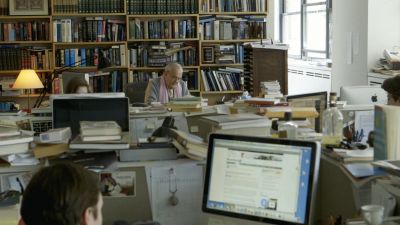
THE NEW YORK REVIEW OF BOOKS: A 50 YEAR ARGUMENT
(USA/2014) R.: Martin Scorsese e David Tedeschi. D.: 97'. V. inglese. Digitale
F.: Ellen Kuras, Lisa Rinzler. M.: Paul Marchand, Michael J. Palmer. Int.: Noam Chomsky, Michael Chabon, Norman Mailer, Joan Didion, Susan Sontag, James Baldwin, Mary Beard, Rae Hederman, Timothy Garton Ash, Robert Silvers (se stessi). Prod.: Margaret Bodde, Martin Scorsese, David Tedeschi per Sikelia Productions. DCP. D.: 97'. Col. Versione inglese / English version. Da: Sikelia Productions
"Quando abbiamo fondato la rivista non volevamo far parte del sistema", dice Robert Silvers, direttore della "New York Review of Books". "Anzi, volevamo tentare di sondare i meccanismi e la sincerità del sistema, fosse esso politico o culturale".
Sin dalla nascita, avvenuta più di cinquant'anni fa durante lo sciopero dei giornali del 1963 a New York, la più importante rivista culturale degli Stati Uniti ha perseguito il suo obiettivo con rigore, con uno stile unico e non senza suscitare controversie. The New York Review of Books: A 50 Year Argument, diretto da Martin Scorsese e dal suo fedele collaboratore David Tedeschi, cavalca le onde della storia letteraria, politica e culturale proprio come ha fatto la celebre rivista.
Provocatorio, eccentrico e incendiario, il film intreccia rari materiali d'archivio, interviste ai collaboratori, estratti da opere di autori emblematici quali James Baldwin, Gore Vidal e Joan Didion e filmati vérité originali girati nella redazione della "Review", nel West Village. Queste scene riflettono l'instancabile attività di una rivista che, trascorsi i suoi primi cinquant'anni, si sente ancora piena di energia come il suo fondatore, Robert Silvers. Il confronto e la discussione intelligente sono nel suo DNA, come illustrano nel film la polemica tra Vidal e Norman Mailer a proposito della liberazione della donna, la geremiade di Mary McCarthy contro l'egemonia americana in Vietnam, l'inchiesta di Mark Danner sull'uso degli interrogatori estremi durante la guerra in Iraq e l'analisi del movimento Occupy svolta da Michael Greenberg. Il reading di Joan Didion, che in occasione delle recenti celebrazioni per il cinquantesimo anniversario della "Review" alla Town Hall di New York ha ripercorso il suo lucidissimo saggio sul Central Park Jogger Case del 1989, esemplifica l'impostazione del film: onorare gli autori, onorare la scrittura e l'impegno della rivista a rivelare la verità in tutta la sua complessità.
Il film riesce a cogliere la forza con cui le idee determinano la storia. "Le riviste non cambiano il mondo" dice il saggista Avishai Margalit, "ma influenzano il clima intellettuale come il cavallo degli scacchi, una mossa in avanti e poi di lato, senza seguire una linea retta".
"When we started the paper, we weren't seeking to be part of an establishment", says Robert Silvers, editor of the "New York Review of Books". "We were seeking quite the opposite, we were seeking to examine the workings and truthfulness of establishments whether political or cultural".
Since its founding over fifty years ago during the New York City newspaper strike of 1963, America's leading journal of ideas has pursued its goal with rigor, a unique style and more than its share of controversy. The New York Review of Books: A 50 Year Argument, directed by Martin Scorsese and his longtime documentary collaborator David Tedeschi, rides the waves of literary, political and cultural history in much the same way as the paper itself.
Provocative, idiosyncratic and incendiary, the film weaves rarely seen archival material, contributor interviews and excerpts from writings by such icons as James Baldwin, Gore Vidal, and Joan Didion with original verité footage filmed in the "Review"'s West Village office. These scenes reflect the humming, restless energy of a magazine that, heading into its second half-century, still feels as vital as its indefatigable founding editor, Robert Silvers. Confrontation and intelligent argument are in its DNA, as illustrated in the documentary by the skirmish between Vidal and Norman Mailer over women's liberation, Mary McCarthy's jeremiad against American hegemony in Vietnam, Mark Danner's investigation into the use of enhanced interrogation during the Iraq war, and Michael Greenberg's analysis of the Occupy movement. Joan Didion's reading from her quietly furious explication of the 1989 Central Park Jogger Case, filmed at the recent fiftieth anniversary event at New York's Town Hall, exemplifies the film's approach: honor the writers, the writing, and the paper's determination to reveal the truth in all its complexity.The film captures the power of ideas in shaping history. "Magazines don't change the world", says contributor Avishai Margalit, "but they shape a certain kind of climate of ideas. Influence is like the knight in chess, one move straight and then diagonal. It doesn't go in straight lines".
The film captures the power of ideas in shaping history. "Magazines don't change the world", says contributor Avishai Margalit, "but they shape a certain kind of climate of ideas. Influence is like the knight in chess, one move straight and then diagonal. It doesn't go in straight lines". The film captures the power of ideas in shaping history. "Magazines don't change the world", says contributor Avishai Margalit, "but they shape a certain kind of climate of ideas. Influence is like the knight in chess, one move straight and then diagonal. It doesn't go in straight lines".

Tariffe:
Aria condizionata
Accesso disabili
Tel. 051 522285











